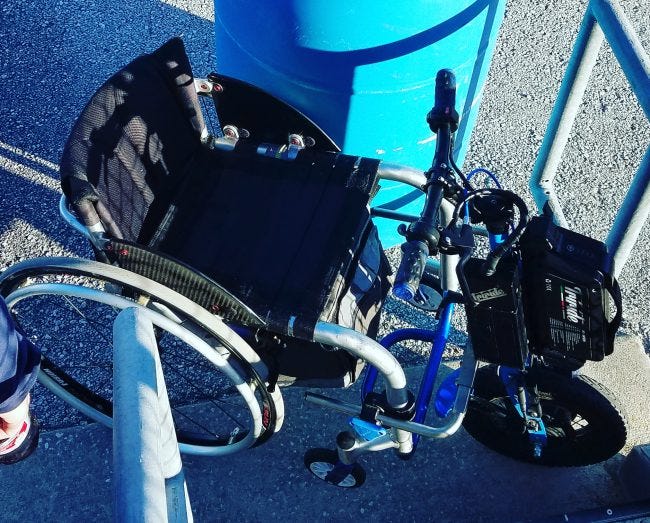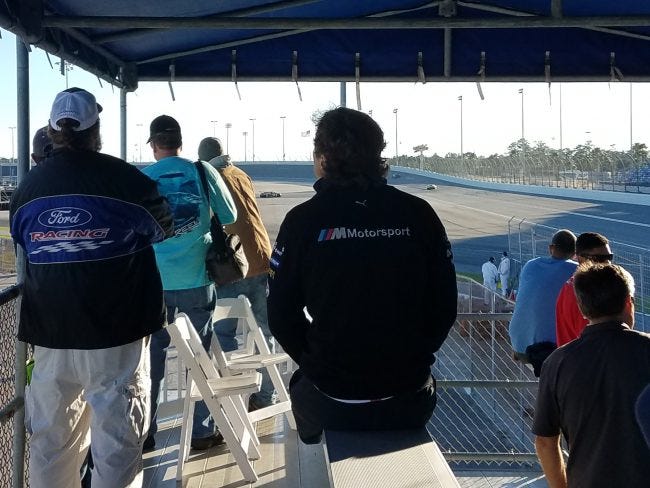Weekly Roundup: My Sweetest Victory Edition

The first time I saw the man in the wheelchair blasting across an empty lot behind the first-turn infield grandstands at Daytona, his hands firmly grasping an odd sort of single-wheeled scooter that pulled the wheelchair along behind it, his longish black hair in electric-current agitation, my attention was focused on the machinery involved. By the time he crossed my field of vision a second time, doing every bit of twenty miles per hour and correcting each skittish twitch of the chair over the parking-lot gravel with a practiced countersteering motion, I took a closer look, noticed that his legs were missing rather than simply immobilized, and realized: It’s Zanardi. Sure enough, when the chair came to a halt at the base of the grandstand stairs, I recognized him by both face and manner: impassive, confident, comfortable in the skin he still owned.
Nothing surprising about the man’s presence here at the “Roar Before The 24”, of course. He was driving a car. A sports car, not an IndyCar like the ones in which he had become famous. Earlier in the day, in one of Daytona’s “radio rooms”, a journalist had asked him if he would ever drive IndyCar again.
“Would you… like to kiss Charlize Theron?” Zanardi had replied. Why yes, the slightly startled reporter had said in response. I suppose I would. And surely he wondered, if only for a moment: Is that something that Zanardi can bring to pass, for me or for himself?
“Well, it is not going to happen, is it? I would like to drive an IndyCar again,” Zanardi then offered, both personally rueful and professionally buoyant, “but it is not going to happen.” When the journalist in question relayed this exchange to me, after all the various classes had qualified and there was nothing left to do but gripe and gossip, I found myself struck by the secret poetry of what was surely a tossed-off response.
After all, each of us starts his life as a creature of nearly infinite potential. There’s nothing to say that we won’t become the President or drive an IndyCar --- or kiss Charlize Theron, for that matter. As we age, however, we perform the reverse alchemy of potential into reality, gold into dross, marked by an inexorable but steadily accelerating drumbeat of doors closing, one after another in rapid sucession. Had he been in a mood to be forthright rather than friendly, Zanardi might have asked his interlocutor: Will you ever drive IndyCar, you sixty-something fellow with your aches and pains and with the vast majority of your life behind you? No? Well, neither will I. That door is closed for both of us now; the difference is that yours closed slowly, outside of your attention, while mine was slammed in my face.
Not that Alex Zanardi has much respect for the idea of not being able to do something. Immediately after coming to a halt at the base of the stairs, approximately fifty feet away, he flung himself headlong from his chair to the concrete. Like a yokel I gasped at this. Then the man grabbed both handrails from below, swung his body above them, and began walking himself up, one hand at a time, in the manner of a gymnast on parallel bars. The speed of his travel, in this fashion, was only slightly slower than what you or I might accomplish on foot. As a display of raw athleticism and strength, it was frankly intimidating.
Upon reaching the top of the stairs, Zanardi performed a pair of additional acrobatic motions and landed perfectly upright on a chest-high aluminum table, all the better to watch the prototypes do their thing into Turn One. Which he was eventually able to do, after posing for pictures and shaking hands with over a dozen race fans, spouses, and miscellaneous children. I sat next to him the whole time but said nothing, having decided that the most respectful and friendly thing in this case would be to act like he was just another spectator. Just keep your mouth shut, Jack! It was more difficult than I would like to admit. I was seized by the notion that I would be able to say something meaningful to him, yet I could not, in my own head, articulate what that might be. I have felt this way in dreams, and perhaps you have as well. I took photographs of the cars as they sped by, conscious that Zanardi would be in them, but also careful not to be one of the many folks simply pointing both finger and lens in his direction.
About twenty minutes later, a uniformed Daytona security officer appeared. His task: to bounce us from the grandstands. “Guys, that gate wasn’t supposed to be open for practice. I’m sorry, guys… Mr. Zanardi, I’m sorry, you have to leave too.” We filed down the stairs in a dejected line, first the young, then the old, then the tragedy-stricken. “It was great while it lasted,” I opined, and Zanardi seemed to nod in agreement. About two minutes later, as Danger Girl and I trudged out of the soon-to-be-closed gate towards the pits, he zipped by to our left, crouched over his chair like a MotoGP rider, eyes forward, completely focused on the future.
If you are a racer or a race fan, you probably know all about Alex Zanardi and his larger-than-life accomplishments both before and after the crash that took his legs. If not, I’d recommend My Sweetest Victory, which will fill you in and then some. The Netflix-style summary: Superbly gifted and dedicated racer endures tragedy, goes on to accomplish virtually (but not, as it turns out, literally) impossible things as a Paralympic athlete. Oh, and he also wins a pro race or two after the fact, using hand controls.
Yet that summary reduces the man to nothing more than an inspirational story, when the truth is so much more complex, and interesting, than that. You see, Zanardi lost his legs because he made a mistake behind the wheel. He was not an innocent bystander, a victim of circumstances, a helpless pawn. He messed up. In that single horrific moment, quite a few doors closed for Alex Zanardi, all at once.
If you have ever made a terrible, life-changing mistake in the space of just seconds --- certainly I have, at least three times --- then you know that sick-from-the-feet-up feeling that seizes you afterwards. You’re there bleeding out on the street or looking at your mangled body in the hospital or slouching with your hands cuffed behind you in a police car and your mind starts to twist and warp around reality until you almost become convinced that you can reverse time and change what has happened. That hopeful dementia can last for seconds, or it can last for months. For some people, it never completely vanishes.
It has been said, regarding the creation of poetry in the traditional iambic-pentameter, heroic-couplet mode, that the first line is the gift of God and the second is the work of Man. I think of that when I consider the process of making, then recovering from, one’s own catastropic mistakes: the first part is an unwelcome gift from our personal demons and the second is the effort of our better selves. The trick, if there is one, lies in taking equal responsibility for both. Even if that mistake will define you for the rest of your life. Even if some people will never forgive you for it. Even if, when all is said and done, you cannot forgive yourself.
In Winning Through Intimidation, Robert Ringer called himself “The Tortoise”. In a world filled with the beautiful, the brilliant, the #Blessed-fortunate, and the merely lucky, Ringer realized that he would never be any of those things. “But if you slow down for just a moment,” he stated, referring to everybody who had started ahead of him through some accident of fate or birth or genetics, “I’ll pass you.” This is what I’ve learned about making big mistakes: you have to understand that you’ve put yourself at the back of the pack. It doesn't matter where you were before, how brilliant or successful or simply healthy you were. Your reality has been adjusted and you are now in what racers call Dead Fucking Last. So you have to be a Tortoise. You have to trudge along without stopping, work harder than everybody else for lesser results, suffer more failure and heartache, expect more disappointment. The key thing here is that you can’t quit. Not for a moment. If you do that, everyone else will keep going without you.
That is the only virtue a Tortoise has: he doesn’t quit. When I watched Alex Zanardi drag himself up those stairs, I knew that I was in the presence of an exemplary Tortoise. I respect him for that, more than I respect him for the Corkscrew pass or for any particular victory before or after his crash.

At the end of the month I’ll be making an announcement regarding this blog, my professional future both in and out of the auto business, and an opportunity I’ve been given to do something truly great on a grand scale. Some people will say that I don’t deserve it, because I’ve made too many unfixable mistakes. Other people might say that it is long overdue. That's certainly what I'm going to say.
This is what I hope you’ll say, and what you will see: an old Tortoise, reaching a finish line simply because he didn’t know when to quit. Perhaps a second-rate turtle, particularly when compared to the Alex Zanardis of the world, but stubborn enough to keep crawling regardless. You have to be comfortable in your skin. I’ve heard that’s an attractive quality, particularly to women. So... does anyone know where I might find Charlize Theron?
* * *
Brother Bark offered a look into the future. I offered a look at some surprisingly venerable cars of the past.

